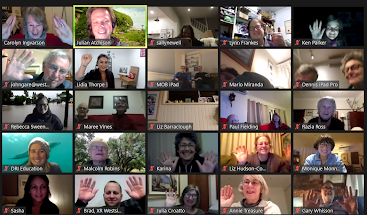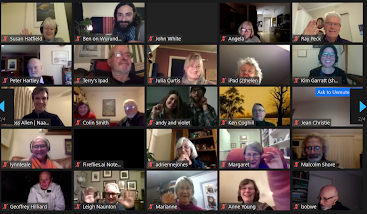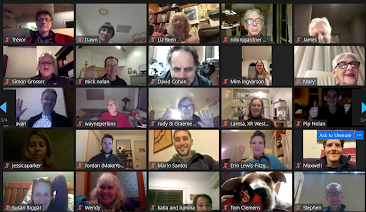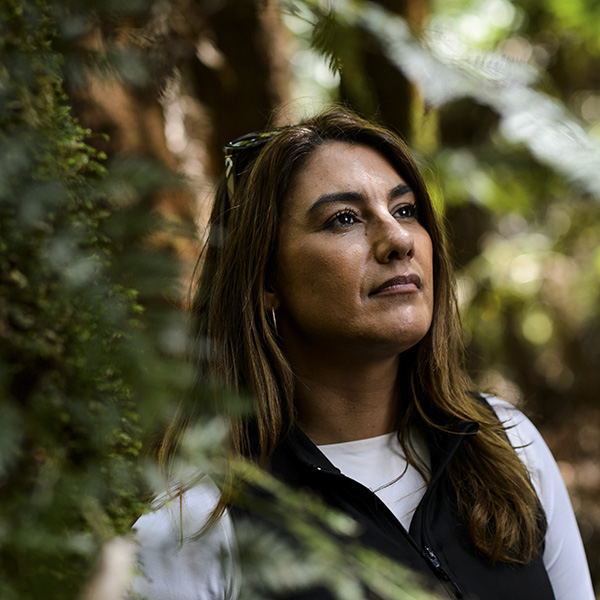For those who missed out, you can relive the night via a recording on our YouTube channel.
We will not go back to normal. Normal never was. Our pre-corona existence was not normal, other than we normalised greed, inequity, exhaustion, depletion, extraction, disconnection, confusion, rage, hoarding, hate and lack. We should not long to return my friends. We are being given the opportunity to stitch a new garment – one that fits all of humanity and nature.
Brené Brown
Communities look after themselves when they look after country.
Lidia Thorpe
Last Wednesday we were joined by Senator-elect for Victoria Lidia Thorpe. Lidia is a Gunnai-Gunditjmara woman, mother and grandmother living on Wurundjeri country. She will soon become Victoria’s first Aboriginal Senator, replacing Richard di Natale of the Greens. She was the first-ever Aboriginal person elected to the Victorian parliament as the member for Northcote, and joined us for an engaging, insightful conversation on issues that we as a movement really need to understand better:
- Systemic racism,
- Environmental degradation,
- Climate injustice,
- Indigenous sovereignty, and
- Lifting up and including Indigenous voices in the climate movement.
How are these struggles all linked, and what can we at Lighter Footprints do to move the conversation forward?
How do you see the connection between the struggle for climate justice and the struggle for Indigenous sovereignty?
The two have to go hand-in-hand. Aboriginal people suffer daily in Australia: abuse, death in custody, incarceration, neglect and inequality. Fighting two seperate struggles apart is exhausting – fighting together and uniting the movements to seek justice for all will produce a better outcome for everybody.
Environment groups have always had a laser-like focus on conservation, and because of that there’s little room for Indigenous voices and almost no seats at the table. Lidia recently finished working with the Australian Conservation Foundation to try and rectify this. She travelled up and down Australia to talk with a wide range of stakeholders: Indigenous communities and leaders, politicians, resource companies and green groups. Put simply, there’s a huge division between Indigenous Australians and environment-climate groups. Mining companies and governments exploit this divide every day to push through projects and policies that have disastrous impacts on Indigenous country. She reflects that:
As long as we’re separated they can deal with us individually. But when we come together we are an unstoppable force.
Jabiluka is a great example. Environment groups marching side by side with Indigenous clans in a campaign led by black women – and we all know what a positive outcome that campaign had.
On the other hand you have the campaign to stop logging in Victoria’s Central Highlands. No Wurundjeri, Gunnai or Tunnerong people were significantly involved in this decades-long fight. In between losing her seat in Victorian state parliament and becoming a federal Senator, Lidia got the clans together to finally get involved. Campaign leaders like Professor David Lindemayer briefed the clans on what was happening and answered an honest question: why hadn’t they been involved up until now? Why do forest campaigners only ever refer to the Leadbeater’s Possum by its Anglo name (given by a 19th century taxidermist) and never acknowledge it as the Wollert, the totem of the Tunnerong people?
An Indigenous angle and inclusion of Indigenous voices in campaigns like the Vic Central Highlands may also help wedge governments in current and future Treaty processes: you want a Treaty? Then stop logging country!
Lidia also saw issues in Queensland with the Adani campaign when travelling. Though the climate movement is beginning to weave the struggle of the Wangan and Jagalingou people into the StopAdani! Campaign, there’s still some way to go. There’s always going to be issues bringing groups together, but it’s worth it to watch the strength of the movement grow.
What recommendations do you have as to how ordinary climate activists (like us) might support you better?
One of the key recommendations Lidia gave to ACF (and which everyone can be part of) is to pay the rent for being on stolen land – giving Aboriginal people economic empowerment in compensation for profiting off stolen country for hundreds of years. At ACF this takes the form of independent office space – a “sovereign hub” where Aboriginal campaigners can be cultivated, trained and supported to protect country and continue the fight for Indigenous rights.
A holistic approach is also a must in Lidia’s eyes: walk with us when we stand up against mass incarceration and deaths in custody, and we’ll stand with you at climate marches and the School Strike protests.
What do young Indigenous activists need, and what can we do to amplify their voices?
They need a platform and to be included in processes! For example, when VicForests completed the last regional forests agreement there were zero Indigenous voices consulted: it was a tick-a-box. We need to be aware too that sometimes platforming may mean stepping aside to let Aboriginal voices in.
Aboriginal people also don’t have the resources and expertise behind them to launch straight into effective campaigns. The sovereign hubs are a great step towards this. Just having a computer with internet, a photocopier, a desk: we’ve got no idea how much we all take the basics for granted! Having young activists working inside the same building as the big orgs, working on the one agenda for the one reason will be so powerful.
Interestingly you don’t see Aboriginal people calling out Aboriginal corporations for making deals with mining companies – environmental groups don’t do it either for fear of being labelled racist! Empowered young activists working in sovereign hubs with the resources and confidence to call out this bad behaviour might just be what the climate movement needs.
How important is nonviolent, civil disobedience action? Can Lidia talk about her experiences on the front line?
It’s extremely important to Aboriginal people. They see violence everyday, and leaders like Lidia don’t want to see any more people die or be thrown in jail. All of us also have to respect the country we’re on, and elders don’t like to see violence committed on their country.
Lidia’s own experience was in Nowa Nowa, East Gippsland. A beautiful gorge runs through the town on its way to Lake Tyers and the Bass Strait, and there are sacred stories associated with the gorge for local Indigenous people. In 2000 the Eastern Gas pipeline was being built and the owners wanted to put explosives through the Nowa Nowa gorge.
At the time, Lidia was a single mum, and she didn’t have an Aboriginal flag lying around – so she made one from old bits of material. Together with her toothless (but dangerous-looking) pit bull chained to a makeshift flagpole, Lidia sat in the way of Duke Energy 4WDs trying to access the gorge, refusing to move. After several months (and an attempted payout by the company) Lidia won, and today the only bend in the Eastern Gas pipeline is as it skirts around the Nowa Nowa gorge en route to Sydney, costing Duke Energy millions of dollars. One person really can make a difference!
Does the saying of acknowledgment of country matter to you Lidia, and should it matter to us?
Lidia wouldn’t force anyone who doesn’t want to say an acknowledgement to do so, or to let it become a tokenistic gesture. In fact Lidia’s told VicForests not to do it! She’s told AGL not to do it: how can they have power stations on her country in the Latrobe Valley and possibly make a genuine acknowledgement? Her preference is for a genuine, personal acknowledgement.
Lidia was recently asked to give an acknowledgement by a young activist, which she agreed to, but gave them a challenge for next time: do your homework and learn something about the country you’re on and the language that was spoken. They returned to give the most beautiful, personal acknowledgment of country. It’s a small thing to ask to learn a little bit of language or some of the history of the country you live on. You then start truth-telling to others and passing on knowledge without realising it. There’s a lot of truth-telling to do in Victoria: even remembrance of massacres with dates, numbers killed and so on has power. After all, we do it every year at the dawn service for fallen troops.
Can you give us your insight into Treaty processes around the country? And, what opportunity would Treaty give Indigenous Australians to drive environmental governance on their own country better?
Victoria is currently “consulting” on a framework process. Inverted commas are intended – the sad fact of the matter is 93% of Victorian Aboriginal didn’t participate in voting for representatives to the Treaty Commission. Treaty at a national level can’t look like what it has in Victoria, and what it’s about to look like in Queensland (which is shaping up to be a direct duplication of Victoria) and more than likely the Northern Territory.
The state government needs to act in good faith too. At a meeting in Bairnsdale with 100 people present, government representatives put up a map showing all the Crown land left in Victoria with a promise this would be part of the negotiations process. The map hasn’t been reproduced since and the government has announced mass public housing and public land sell-offs: there’s uncertainty exactly how much of the “dangled carrot” is actually left to negotiate with. Lidia doesn’t want future Treaty processes to look like this, but sadly she’s not holding her breath.
At a national level Lidia would like to see international scrutiny of any future Treaty. Australia desperately needs to decolonise and shift its mindset, which may only be possible through outside help. And a good Treaty outcome will help everybody. A proper Treaty will enable us to negotiate closure of power stations, negotiate better outcomes for environment, wildlife and water and solve the problems that current Native Title legislation cannot. At the moment Native Title runs for the benefit of the miners and not the people – we’ve seen lots of examples of this recently, like Rio Tinto’s destruction of the Juukan Gorge.
Can you talk a little more on decolonising language?
It really is about changing names – though perhaps let’s not start with changing the name of Victoria! At a local level there are massive opportunities to do this within Victoria. And Indigenous names all have stories and meaning associated with them, so it’s a learning exercise that dares people’s attention to local landscape and/or wildlife features.
Decolonisation can also occur within systems. Aboriginal society was and is a caring, sharing structure that has looked after its people for thousands of generations. Mantras of only taking what you need, sharing and looking after the sick, the poor and the elderly have a place in modern Australia, even if the people currently in charge don’t believe so.
Are there any international examples of good Treaty?
None of them are perfect – they’ve all been broken. The pros and cons of those Treaties (especially ones done with the Crown) could and should be considered in forging Australia’s own process. And Treaty has to be done for the people by the people.
Twenty years ago John Howard resourced the biggest consultation that’s ever happened with Aboriginals through the Reconciliation Process. There were community liaisons and town hall meetings happening everywhere across Australia. Though the sad final outcome of that process was that Australia was too racist to reconcile, we’ve come a long way since then. Replicating the Reconciliation Process but for a Treaty is a great first step. Put the Uluru Statement on the agenda, put everything on the agenda and consult, consult, consult. Look at the overarching themes that emerge and start an informed Treaty process from there.
Just briefly on Waitangi: there are lots of good elements in there. When you go between different Maori countries it’s clearly signposted. They’ve got dedicated seats in Parliament, but those seats are all party-aligned. Lidia doesn’t want to see Aboriginal people with reserved seats that have to align to party machinery: Independents would be ideal.
Is Treaty something you want to push as a Senator?
Yes. Treaty could be the one thing that brings all Australians together and unites the movements. It could be the glue that sticks us all together and addresses all our injustices: social, environmental and intergenerational. Wouldn’t it be wonderful to celebrate together instead of hiding on 26th of January, or rallying on 26th January?
What about the Green New Deal?
Absolutely, the GND fits very well with Treaty. It’s about sustainable jobs and goes hand-in-hand with a better future for Aboriginal and other Australians – plus Lidia will be able to give us the decolonised version!
What about cultural burning and traditional fire management practices – should the government be listening?
Cultural burning is only one example of thousands of years of Indigenous knowledge that’s on offer to mainstream Australia – if we’re given the opportunity!but they need to be given the opportunity. It fits neatly into elevating Aboriginal voices and making space for Aboriginal practices to reach decision-making levels. Lidia is concerned that cultural burning may also be used as an excuse to burn where it’s not needed and used by organisations that otherwise cause a lot of harm to country. Whatever is done needs to be done properly and scientifically, but there’s no reason for this not to happen.
How effective is getting climate and environment groups to acknowledge a “new” relationship with the land, closer to what Indigenous Australians feel for country?
One of the recommendations to ACF was to share all the findings of the report with other orgs and encourage them to adapt. Some haven’t, but one great example has been Environment Victoria working with traditional owners on the closure of Latrobe Valley power stations. For the first time Gunnai people are working with environmental groups on Gunnai country to achieve better outcomes for the environment! For decades pollution from coal-fired power has been causing health problems to local Aboriginal communities, but now in 2020 we can finally have conversations about righting these wrongs and involve them in the solution!
There are many other examples where environment groups have reached out to Indigenous groups for advice, guidance and permission, or to offer resources, support and expertise to Aboriginal campaigners. The work is slow, but it’s happening.
In small breakout rooms the audience was asked to share what had struck them most about Lidia’s talk. There were some honest, inspiring conversations with people finding they had some tangible, achievable actions to move forward with to make the movement a better place for Indigenous Australians. Things like:
- Taking the time to research your own personal acknowledgement of country
- Listening!
- Walking together
- Finding out meaningful ways to help pay the rent
- Taking the time to learn some Woiwurrung language
With the final word Lidia recalled a powerful memory. At her first School Strike event she’ll never forget the sights and sounds of thousands of mostly white school children repeating after the speaker “Aboriginal land – always was and always will be”. She felt so empowered by the thought that finally Aboriginal Australians weren’t in this fight alone anymore. Tonight also represents that for Lidia: we’re not alone, and we’re stronger together.
Finally, she thanked Lighter Footprints members for their work caring for country and each other. For our part we thank her for an engaging, thought-provoking night that gives us the strength and courage to be better.
Relive the night via our YouTube channel.
Get some more info and background reading on systemic racism via our pre-event blog.
And make sure to RSVP to our next event – “Councils stepping up on climate”. See everyone on Wednesday 26 August at 7:30 pm!




